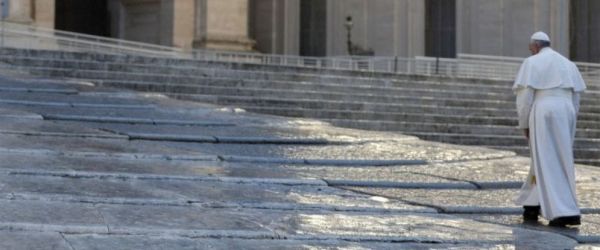Loving our enemies, those who persecute us and make us suffer, is difficult and not even a 'good deal' because it impoverishes us. Yet this is the way indicated and travelled by Jesus for our salvation [...].
During his homily, the Pontiff recalled that the liturgy in these days proposes to reflect on the parallels between 'the old law and the new law, the law of Mount Sinai and the law of the Mount of the Beatitudes'. Going into the specifics of the readings - taken from St. Paul's second letter to the Corinthians (8:1-9) and from the Gospel of Matthew (5:43-48) - the Holy Father dwelt on the difficulty of loving enemies and asking how it is possible to forgive, he added: "We too, all of us, have enemies, everyone. Some enemies weak, some strong. We too many times become enemies of others; we do not love them. Jesus tells us we must love our enemies'.
This is not an easy task and, generally, "we think Jesus asks too much of us. We think: 'Let's leave these things to the cloistered nuns who are holy, to some holy souls!'". But that is not the right attitude. "Jesus," the Pope recalled, "says that you must do this because otherwise you are like the publicans, like the pagans, and you are not Christians". Faced with the many dramas that mark humanity, he admitted, it is difficult to make this choice: how can one love, in fact, 'those who make the decision to bomb and kill so many people? How can one love those who, for the love of money, do not let medicine reach those in need, the elderly, and let them die?" And again: 'How can one love people who only seek their own interest, their own power, and do so much evil?
I do not know,' said the bishop of Rome, 'how this can be done. But Jesus tells us two things: first, look to the Father. Our Father is God: he makes the sun rise on the bad and the good; he makes it rain on the just and the unjust. Our Father in the morning does not say to the sun: "Today enlighten these and these; not these, leave them in the shade!" He says: 'Enlighten everyone. His love is for all, his love is a gift for all, good and bad. And Jesus ends with this advice: 'You therefore be perfect as your heavenly Father is perfect'". So Jesus' instruction is to imitate the Father in "that perfection of love. He forgives his enemies. He does everything to forgive them. Let us think with how tenderly Jesus receives Judas in the Garden of Olives", when among the disciples there are those who are thinking of revenge.
"Revenge," the Pontiff said in this regard, "is that meal that tastes so good when eaten cold" and that is why we wait for the right moment to carry it out. "But this," he repeated, "is not Christian. Jesus asks us to love our enemies. How can this be done? Jesus tells us: pray, pray for your enemies". Prayer works miracles and this is true not only when we are in the presence of enemies; it is also true when we nurture some antipathy, "some small enmity". And so we must pray, because 'it is as if the Lord came with oil and prepared our hearts for peace'.
But - added the Pope addressing those present - "now I would like to leave you with a question, which each person can answer in his own heart: do I pray for my enemies? Do I pray for those who do not love me? If we say yes, I say: go ahead, pray more, because this is a good way. If the answer is no, the Lord says: Poor you! You too are the enemy of others! Then you must pray for the Lord to change their hearts'.
The Pope then warned against attitudes aimed at justifying revenge according to the degree of the offence received, the evil done by others: revenge, that is, based on the principle 'an eye for an eye, a tooth for a tooth'. We must look again to the example of Jesus: "For you know the grace of which the Apostle Paul speaks today: though he was rich, he became poor for your sake, that you might become rich through his poverty. It is true: love of enemies impoverishes us, makes us poor, like Jesus, who, when he came, lowered himself to the point of making himself poor". Perhaps it is not a 'good deal', the Pontiff added, or at least not according to the logic of the world. And yet, 'it is the way that God has done, the way that Jesus did', to the point of winning for us the grace that has made us rich.
This "is the mystery of salvation: with forgiveness, with love for the enemy, we become poorer. But that poverty is fruitful seed for others, just as Jesus' poverty has become grace for us all, salvation. Let us think of our enemies, of those who do not love us. It would be nice if we offered the Mass for them, if we offered the sacrifice of Jesus for them who do not love us. And also for us, so that the Lord may teach us this wisdom: so difficult but also so beautiful and make us similar also to his Son, who in his lowering made himself poor to enrich us with his poverty".
[Pope Francis, meditation at St Martha's, in L'Osservatore Romano 19/06/2013]












